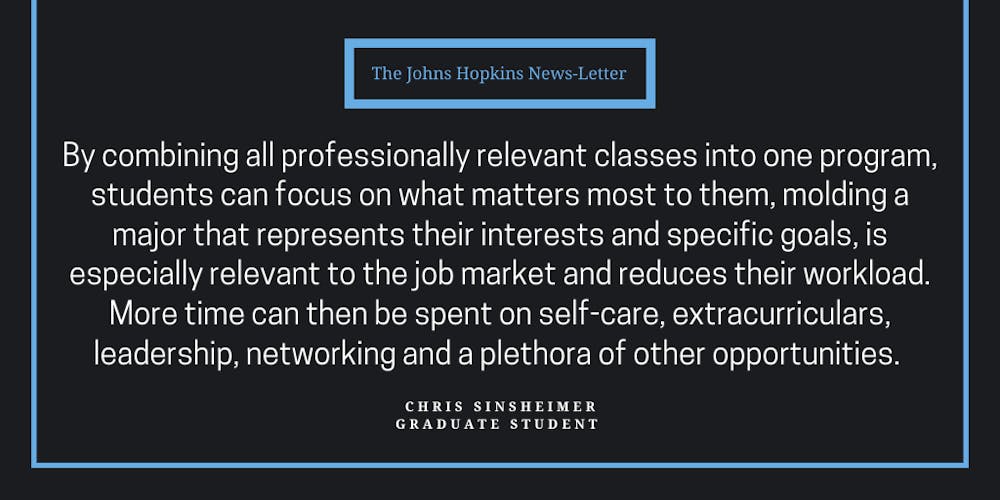Currently, Hopkins offers 52 majors and 50 minors in areas ranging from archaeology and math to accounting and music, respectively. 52 choices provide a wide assortment of options and perhaps allow a Blue Jay more academic flexibility than smaller institutions. Yet the traditional structure of rigid majors and minors does not provide the flexibility that is now demanded in the academic and professional worlds. In the cut-throat world we live in, a bachelor's degree from an elite school at the top of a resume no longer packs the same punch it used to and it becomes necessary to focus on a specific skill set for a technical career.
What major works for undergraduate students planning on working in Fintech? The minor in Financial Economics teaches the financial aspect but omits the engineering, math and computer science components. Meanwhile, a major in engineering covers the technical component but fails to prepare students for the interpersonal skills of business. As an undergraduate, I had peers who chose to do double majors and triple minors to acquire the skills that were needed for Fintech and similar fields. Some ambitious students even attempted to complete triple majors, often in difficult fields of study. According to the University’s Undergraduate Admissions, 68% of students double major.
The problem with doing this is that attempting to complete many simultaneous degrees likely leaves little time, if any, for extracurriculars, leadership roles and networking. Without these experiences, students are likely unable to succeed in a modern-day job hunt. Students are then presented with a choice between pursuing leadership and networking opportunities and completing their multiple majors.
With an Interdisciplinary Studies major, one does not need to complete multiple majors in order to gain expertise in a specific field or prepare for a career path. Instead of a triple major, one could pursue a singular major in a precise area of interest. For example, rather than completing degrees in math, economics, statistics and engineering, one can simply declare a major in Financial Technology. This combines all of the required areas of study into one major, a much more achievable goal.
At Hopkins, students are permitted to design their own unique course of study and major, and can combine all aspects of education that they require for their careers into one singular major. The ability to design an unique major makes it possible to create a professionally focused plan of study without increasing the burden on students in terms of number of credits or classes. Interdisciplinary studies allow students to refine what they learn rather than sludging through unrelated courses.
By combining all professionally relevant classes into one program, students can focus on what matters most to them, molding a major that represents their interests and specific goals, is especially relevant to the job market and reduces their workload. More time can then be spent on self-care, extracurriculars, leadership, networking and a plethora of other opportunities.
An interdisciplinary major allows you to study what you think is relevant. Students in the interdisciplinary program choose courses, along with an advisor, that support the plan of study that matches their interests and goals. For a student planning on focusing on the study of the American Civil War it might make sense to major in history or political science.
However, upon examining the required courses for these majors, some requirements of the History Major, such as the intermediate language requirement, seem to bog down potential scholars with work that adds little to the study of the American Civil War. Additionally, while taking courses on other regions of the world is crucial for most students of general history, it is less crucial to scholars of regional conflicts such as the American Civil War or the 1794 Whiskey Rebellion, which were more regional in nature and less affected by international influences.
Often, the field of study that a student might wish to pursue doesn’t exist at all. For a student wishing to study Indigenous Studies or Medieval Literature, there simply is no available option for them. As a prestigious research university, Hopkins has a long tradition of producing top scholars and perhaps a responsibility to continue doing so. Many students attend Hopkins with the understanding that it is a vital stop along the way to a career in academia. Important scholars, such as Nobel Prize winners and U.S. President Woodrow Wilson, studied at Johns Hopkins.
There is an eminent need for Hopkins scholars to recognize these changing academic demands and choose a path that can help them enter the world of higher education, even as the number of tenure-track positions shrinks rapidly. To obtain a tenure-track position in the Medieval Studies department, one absolutely should be an expert on that specific topic, not the recipient of a generic and ultimately useless degree in a semi-tangential field. In contrast, an interdisciplinary major allows students to focus on a topic that they wish to study and become experts on that specific topic.
For these reasons, it is vital that students, faculty and university leaders open their eyes and see the importance of interdisciplinary studies not as a niche novelty but as the future of education. It provides focus on what is important: flexibility for specific careers and interests which traditional majors do not currently accommodate, and opportunities for scholarship in places where there would otherwise be none such as Indigenous Studies or Criminology.
Adding this additional flexibility and opportunities to explore, or even create, new fields of study is why the interdisciplinary major is so important. It provides a path of individualized study that is unavailable otherwise. Although traditional majors seem like a good system, interdisciplinary studies is a superior alternative that the university needs to focus on.
Chris Sinsheimer is a first-year master’s student in communications from Washington D.C. and received his BA from NYU.





